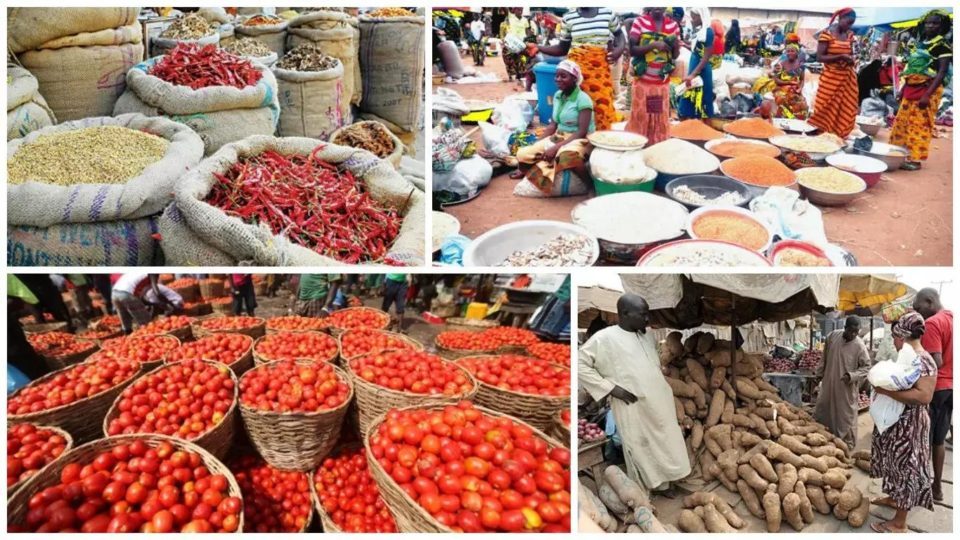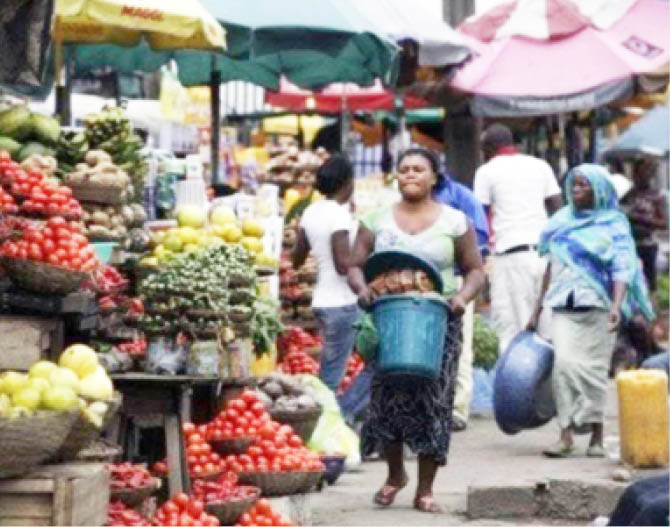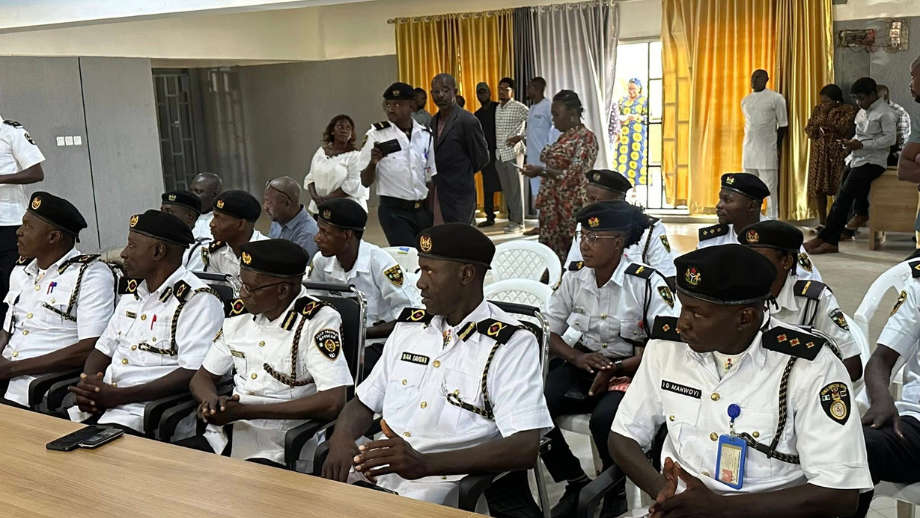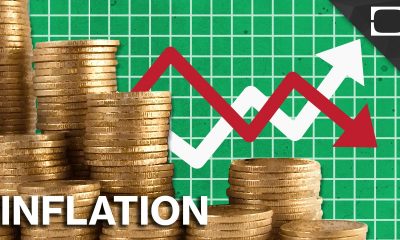Business
UPDATED: Inflation rises to 17.33%, highest in four years

Inflation rate in Nigeria has risen to 17.33 per cent, the highest in four years, according to the latest statistics on the issue from the National Bureau of Statistics.
It stated that the consumer price index, measuring the rate of increase in the price of goods and services, increased to 17.33 percent in February.
This is the highest point since April 2017.
According to the CPI/Inflation report released by the NBS on Tuesday, the food inflation stood at 21.79 per cent, the highest point since the 2009 data series began.
On a month-on-month basis, the headline index increased by 1.54 per cent in February 2021. This is 0.05 per cent rate higher than the rate recorded in January 2021 (1.49 per cent.
The percentage change in the average composite CPI for the 12-month period ending February 2021 over the average of the CPI for the previous period was 14.05 per cent, showing 0.43 per cent point from 13.62 per cent recorded in January 2021.
The urban inflation rate increased by 17.92 per cent (year-on-year) in February 2021 from 17.03 per cent recorded in January 2021, while the rural inflation rate increased by 16.77 per cent in February 2021 from 15.92 per cent in January 2021.
On a month-on-month basis, the urban index rose by 1.58 per cent, up by 0.06 the rate recorded in January 2021, while the rural index rose by 1.50 per cent, up by 0.04 the rate that was recorded in January 2021 (1.46) per cent.
The corresponding 12-month year-on-year average percentage change for the urban index is 14.66 percent in February 2021.
This is higher than 14.23 per cent reported in January 2021, while the corresponding rural inflation rate is 13.48 per cent compared to 13.04 per cent recorded in January 2021.
Food
The composite food index rose by 21.79 per cent in February 2021 compared to 20.57 per cent in January 2021.
This rise in the food index was caused by increases in prices of bread and cereals, potatoes, yam and other tubers, meat, food products such as fruits, vegetable, fish and oils and fats.
On a month-on-month basis, the food sub-index increased by 1.89 per cent, up by 0.06 per cent from 1.83 per cent recorded in January 2021.
The average annual rate of change of the Food sub-index for the 12-month period ending February 2021 over the previous 12-month average was 17.25 per cent, 0.59 per cent from the average annual rate of change recorded in January 2021 (16.66) percent.
The “All items less farm produce” or core inflation, which excludes the prices of volatile agricultural produce stood at 12.38 per cent in February 2021, up by 0.53 per cent when compared with 11.85 per cent in the previous month.
On a month-on-month basis, the core sub-index increased by 1.21 per cent in February 2021. This was down by 0.05 per cent when compared with 1.26 per cent recorded in January 2021.
The highest increases were recorded in the cost of passenger transport by air, medical services, miscellaneous services relating to the dwelling, hospital services, passenger transport by road, pharmaceutical products, paramedical services, repair of furniture, vehicle spare parts, maintenance and repair of personal transport equipment, motor cars, dental services and hairdressing salons and personal grooming establishment,
The average 12-month annual rate of change of the index was 10.77 per cent for the 12-month period ending February 2021. This is 0.25 per cent higher than 10.52 per cent recorded in January 2021.
States
The CPI is weighted by consumption expenditure patterns which differ across states. Accordingly, the weight assigned to a particular food or non-food item may differ from state to state making interstate comparisons of consumption basket inadvisable and potentially misleading.
All items inflation
In February 2021, all items inflation on a year-on-year basis were highest in Kogi (24.73 per cent), Bauchi (22.92 per cent) and Ebonyi (20.45 per cent), while Enugu (14.73 per cent), Kwara (14.25 per cent) and Cross River (12.97 per cent) recorded the slowest rise in headline year-on-year inflation.
On a month-on-month basis, however, in February 2021 all items inflation was highest in Kogi (3.25 per cent), Ondo (2.46 per cent) and Kebbi (2.43 per cent), while Kwara (0.84 per cent), Kano (0.70 per cent) and Oyo (0.38 per cent) recorded the slowest rise in headline inflation month on month.
Business
Inflation Slows to 15.10% as Food Prices Eased in January

Inflation Slows to 15.10% as Food Prices Eased in January
Nigeria’s inflation rate recorded a marginal decline to 15.10 per cent in January 2026, signalling a slight moderation in consumer prices at the start of the year.
Latest data released on Monday by the National Bureau of Statistics (NBS) showed that headline inflation dipped from 15.15 per cent in December 2025, reflecting a 0.05 percentage point decrease.
The NBS, in its January Consumer Price Index (CPI) report, also revealed that food inflation — a key driver of household spending pressures — eased significantly to 8.89 per cent in January, down from 10.84 per cent recorded in December.
According to the bureau, the CPI dropped to 127.4 points in January from 131.2 points in the preceding month, representing a 3.8-point decline.
On a month-on-month basis, inflation fell sharply to -2.88 per cent in January, compared to 0.54 per cent in December — a 3.42 percentage point swing.
This indicates that the average price level not only slowed but contracted within the month under review.
“The Consumer Price Index (CPI) declined to 127.4 in January 2026, reflecting a 3.8-point decrease from the preceding month (131.2),” the NBS stated.
It added, “In January 2026, the headline inflation rate eased to 15.10%, down from 15.15% in December 2025.
“On a month-on-month basis, the headline inflation rate in January 2026 was -2.88%, which was 3.42% lower than the rate recorded in December 2025 (0.54%).”
The moderation in both headline and food inflation may offer cautious optimism for households and policymakers, particularly amid ongoing economic reforms and cost-of-living concerns.
However, analysts note that while the decline suggests easing price pressures, the overall inflation rate remains elevated, keeping purchasing power under strain.
Auto
Appeal Court Ruling on VIO Limited to Abuja, Not Lagos — LASG

Appeal Court Ruling on VIO Limited to Abuja, Not Lagos — LASG
The Lagos State Government has dismissed widespread claims that a recent Court of Appeal judgment has stripped Vehicle Inspection Officers (VIOs) of their powers across Nigeria, insisting that the ruling applies strictly to the Federal Capital Territory (FCT).
The clarification follows public reactions to a decision of the Court of Appeal, Abuja Division, which upheld an earlier ruling of the Federal High Court restraining Vehicle Inspection Officers and the Directorate of Road Traffic Services in the FCT from stopping motorists, impounding vehicles, or imposing fines.
The judgment triggered viral interpretations suggesting that VIO operations had been outlawed nationwide.
However, Lagos State Attorney-General and Commissioner for Justice, Lawal Pedro, SAN, described such interpretations as legally inaccurate and misleading.
Basis of the Court Decision
According to Pedro, both the Federal High Court and the Court of Appeal premised their decisions on the absence of statutory authority empowering VIO officials in the FCT to stop, impound, confiscate vehicles, or impose fines on motorists.
READ ALSO:
- Terror in Lagos Traffic: Cutlass Gang Unleashes Mayhem on Mile 12–Ketu Road
- FG Drags El-Rufai to Court Over Alleged NSA Phone Interception
- Mystery in Lekki: Police Probe Death of Two Nollywood Crew Found Lifeless in Parked Car
“It is important to understand that the Honourable Judge of the Federal High Court and Justices of the Court of Appeal premised their decision on absence of statutory power conferred on the Respondents to stop, impound or confiscate vehicles and/or impose fines on motorists on roads in FCT Abuja,” he stated.
He noted that the courts did not declare vehicle inspection enforcement unconstitutional in Nigeria, but rather ruled specifically on the legal framework governing the FCT authorities involved in the suit.
Why Lagos Is Different
The Lagos government stressed that Nigeria’s federal structure allows states to legislate on residual matters such as road traffic management and vehicle inspection.
Pedro explained that Lagos operates under the Lagos State Transport Sector Reform Law, which expressly establishes and empowers the Vehicle Inspection Service (VIS).
Section 12(1) of the law authorises the VIS to:
Inspect and regulate the roadworthiness of vehicles
Conduct pre-registration inspections
Issue Road Worthiness Certificates
Collaborate with other relevant agencies to enforce traffic laws
In addition, Section 23(1) provides for penalties against offenders, subject to adjudication before mobile or magistrate courts, ensuring judicial oversight.
Not of Nationwide Effect
While acknowledging that the appellate decision is binding within the FCT, the Lagos government emphasised that it does not have automatic nationwide application.
“The judgment, though binding, is not of general application or of nationwide effect in Nigeria,” the ministry stated.
The state government stressed that VIS officers in Lagos remain legally empowered to carry out enforcement duties under extant state laws.
Wider Implications
The controversy underscores ongoing debates over traffic enforcement powers in Nigeria, particularly the constitutional boundaries between federal and state authorities.
Legal analysts note that unless the Supreme Court delivers a broader pronouncement on the issue, enforcement powers will continue to depend largely on the specific statutory framework establishing such agencies in each jurisdiction.
For now, Lagos authorities insist that vehicle inspection and traffic enforcement operations in the state remain valid and legally grounded.

Appeal Court Ruling on VIO Limited to Abuja, Not Lagos — LASG
Auto
Chanrai Storms Nigeria’s Gas Market, Unveils High-Capacity CNG, LNG Solutions to Power Energy Shift

Chanrai Storms Nigeria’s Gas Market, Unveils High-Capacity CNG, LNG Solutions to Power Energy Shift
By Rasheed Bisiriyu
Nigeria’s drive towards cleaner and more affordable transport fuel gathered fresh momentum on Friday as Chanrai Nigeria Limited formally entered the country’s gas distribution space, unveiling high-capacity CNG and LNG compression technologies in Lagos.
The company, a member of the globally diversified Kewalram Chanrai Group, announced a strategic partnership with India’s Tulip Compression to roll out advanced compressor packages and integrated “single window” CNG solutions aimed at accelerating the Federal Government’s Presidential CNG Initiative.
Chief Operating Officer of Chanrai Nigeria Limited, Anil Sahgal, described the Tulip CNG Compressor Packages as a “game-changer” for Nigeria’s evolving energy landscape.
“With our commitment to safety, efficiency and OEM-grade partnership, we’re empowering the nation to achieve its CNG ambitions while driving economic growth and environmental sustainability,” Sahgal said.
The move marks Chanrai’s expansion beyond its traditional business interests — which span automobiles, agro-products, healthcare and fast-moving consumer goods — into the fast-growing gas infrastructure segment, as fleet operators and industrial users increasingly seek alternatives to petrol and diesel.
Under the partnership, Chanrai Nigeria and Tulip Compression will deliver Compression Station on Single Window (CssW) solutions — integrating compressors, dispensers, storage and stainless-steel tubing under one brand — to simplify deployment and reduce installation timelines.
The compressor packages come in a wide capacity range, from 250 to 4,500 standard cubic metres per hour, making them suitable for small refuelling stations as well as large gas hubs.
A 1,400 SCMH gas engine-driven booster compressor is designed to refuel heavy-duty CNG trucks in about 20 minutes by drawing gas from tube trailers.
The systems are available in both electric motor-driven and gas engine-driven configurations, eliminating the need for large gas generators while ensuring energy efficiency and lower life-cycle costs.
According to the company, the equipment features dual-chamber leak-proof safety systems, advanced sealing technology to eliminate gas loss and global certifications including ATEX, CE, BIS and SGS standards.
The unveiling underscores the growing private sector response to government reforms encouraging gas adoption as a cost-effective and environmentally friendly alternative fuel.
With the compressor packages now available for immediate orders, Chanrai Nigeria said it would provide 24/7 after-sales support, operations and maintenance services, as well as remote asset monitoring solutions.
The development signals intensifying investment in CNG infrastructure as Nigeria seeks to deepen local gas utilisation, reduce fuel import dependence and cushion consumers from volatile petrol prices.
-

 Education2 days ago
Education2 days agoCheck Your Name: UNILORIN Releases Updated NELFUND Refund List for 2024/2025 Students
-

 News1 day ago
News1 day agoOsogbo Sons and Daughters Mark 5th Anniversary with Awards, Political Undertones
-

 metro3 days ago
metro3 days agoWoman Arrested Over Murder of Nigerian E-Hailing Driver in South Africa
-

 metro18 hours ago
metro18 hours agoUS Freezes Assets of Eight Nigerians Over Boko Haram, ISIL, Cybercrime Links
-

 metro3 days ago
metro3 days agoBoko Haram Terrorists Release Video of 176 Abducted Kwara Residents
-

 News2 days ago
News2 days agoAfenifere Calls for Immediate Take-Off of State Police as Terror Threats Rise in Yorubaland
-

 metro2 days ago
metro2 days agoUS Military Boosts Support for Nigeria’s Fight Against Insurgency With Ammunition, Troop
-

 metro18 hours ago
metro18 hours agoTerror in Lagos Traffic: Cutlass Gang Unleashes Mayhem on Mile 12–Ketu Road















